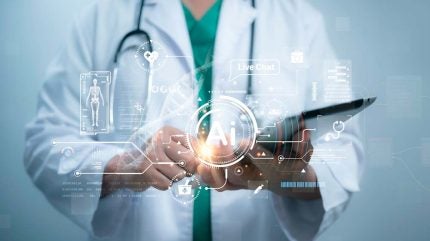
Artificial intelligence (AI) has become one of the most talked-about technologies of our time, but when it comes to complex uses such as clinical research, separating the hype from reality is not always straightforward. The latest CRScube report, AI in Clinical Data Processes: Optimising Use Cases, explores where AI is proving its worth and where caution and human supervision remain essential.
The growing applications of AI in clinical research
GlobalData predicts the global AI market will rise to more than $1trn by 2030, up from just over $100bn in 2023. However, clinical research operates in one of the most highly regulated environments. Any mistakes with AI adoption can cost time, money, and most importantly, patient trust.
In CRScube’s new report, the company’s chief technology officer Gidae Yeo explains that AI technology only delivers when applied to clearly defined problems and when fuelled by high-quality data. In particular, rules-based tasks that follow clear, repeatable logic are well-suited for AI integration. The real benefits come when AI is deployed with precision, whether in transforming unstructured text into usable formats or streamlining the complexities of medical coding.
One of the most promising impact areas highlighted is patient recruitment, which has long been considered one of the biggest bottlenecks in clinical trials. With approximately 80% of studies failing to meet enrolment timelines, AI can step in to analyse data from social media, search engines, and epidemiological sources to pinpoint where eligible patients are likely to be found. However, limitations can include bias being baked into training models, which risks skewing recruitment towards certain populations, potentially undermining diversity and equity in research.
Another key theme discussed in the report is data quality. Modern trials produce vast amounts of information, from lab results and imaging scans to wearable-device feeds and physician notes. AI tools are increasingly adept at detecting anomalies, flagging potential protocol deviations, and helping data managers organise data accordingly.
The future of AI in clinical trials
Looking ahead, AI agents are under development, which has the potential to shift the technology’s role from assistant to co-worker – not just automating tasks but dynamically managing the flow of information between trial systems.
The report also considers how AI could help foster stronger patient relationships by tailoring communications to participants’ age, literacy level, and cultural context. AI could be used to provide clearer, more empathetic messaging, reducing confusion, and improving patient retention.
However, for now, AI is best viewed as an augmentation tool, not a replacement for human judgment. CRScube encourages a problem-first, precision-focused approach to AI adoption, encouraging companies to invest early but wisely, start with defined problems, and keep human oversight at the core.
Download the full CRScube report today to explore how AI is transforming clinical data processes and how you can ensure your own adoption efforts deliver real-world impact.



